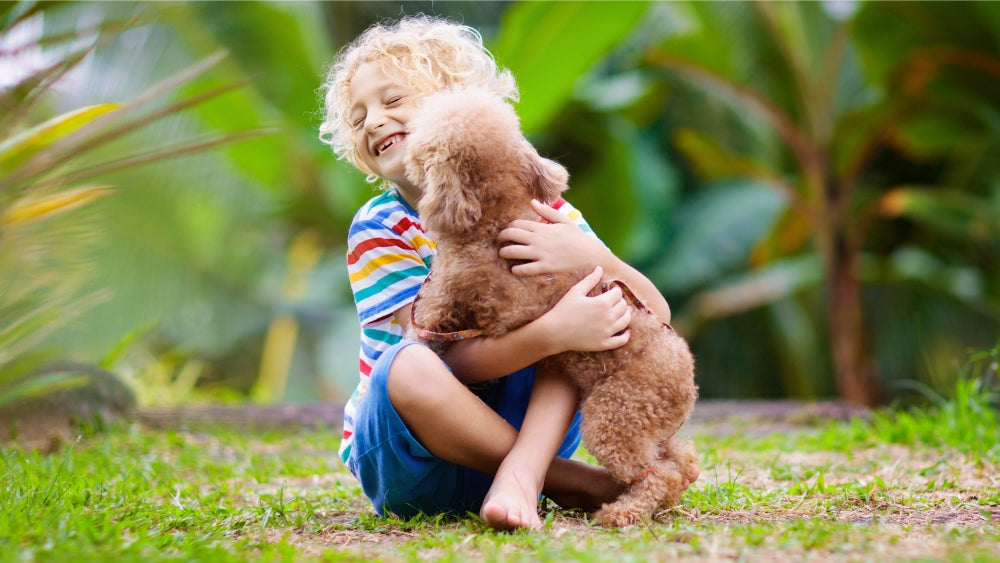
The Unbreakable Bond: Benefits of Raising Kids with Dogs and Ensuring a Safe and Happy Relationship
Share
The companionship between children and dogs has long been celebrated as a special and heartwarming bond. Dogs, often referred to as man's best friend, offer more than just a wagging tail and wet nose—they become loyal confidants, playmates, and protectors for the little ones. Raising kids with dogs comes with a myriad of benefits, including fostering empathy, teaching responsibility, and providing emotional support. However, ensuring a safe and happy relationship between them is essential. In this blog, we will explore the advantages of this unique connection and offer tips to create a harmonious environment where both children and dogs can thrive.
Benefits of Raising Kids with Dogs
- Developing Empathy and Compassion
Growing up with dogs teaches children empathy and compassion naturally. Caring for another living being fosters a sense of responsibility and nurturance in kids. Understanding a dog's needs, such as feeding, grooming, and playtime, encourages children to be more attuned to the feelings and needs of others.
- Emotional Support and Stress Relief
Dogs possess an uncanny ability to sense emotions, providing comfort and unconditional love. Their mere presence can ease stress and anxiety, making the challenges of childhood easier to navigate. A dog's warm and affectionate nature can be a great source of comfort for a child going through tough times.
- Encouraging Physical Activity
With dogs around, kids are more likely to engage in physical activities. Playtime in the yard, walks in the park, or games of fetch keep children active and promote a healthier lifestyle. Dogs also serve as great motivators for regular outdoor exercise.
- Strengthening the Immune System
Studies suggest that children growing up with dogs have a reduced risk of developing allergies and asthma. Regular exposure to dog dander and the microbes they carry helps to strengthen a child's immune system, promoting overall health.
- Building Confidence and Self-Esteem
Dogs are non-judgmental companions, always supportive and loving. Interacting with dogs boosts a child's confidence and self-esteem, as they find comfort in the presence of a friend who accepts them unconditionally. Children often gain a sense of security and self-assurance when they have a loyal canine companion by their side.
- Teaching Responsibility
Taking care of a dog involves regular routines, such as feeding, grooming, and walking. Through these responsibilities, children learn valuable life skills, time management, and the importance of fulfilling commitments. The sense of accomplishment in caring for another living being can instill a strong sense of responsibility in kids.
- Enhancing Social Skills
Children with dogs often become more social and outgoing. The shared interest in their furry friends can spark conversations and friendships with other dog-loving kids and their families. Dogs can act as social bridges, helping children interact and bond with their peers.

Ensuring a Safe and Happy Relationship
- Choose the Right Dog Breed
When selecting a dog for a family with children, consider the breed's temperament, energy level, and size. Breeds known for their patience, gentleness, and friendliness, such as Labrador Retrievers, Golden Retrievers, and Beagles, are often great choices for families with kids.
- Teach Children How to Interact with Dogs
Educate your children on the appropriate ways to interact with dogs. They should be taught to approach dogs calmly, ask for permission before petting a new dog, and avoid behaviors that may scare or agitate the animal.
- Supervise Interactions
Always supervise interactions between young children and dogs, especially when they are getting to know each other. This helps prevent accidental rough play or behavior that could lead to misunderstandings.
- Establish Boundaries
Teach both children and dogs to respect each other's boundaries. Children should understand that a dog's bed or eating area is off-limits, and dogs should have a safe space where they can retreat when they need a break.
- Train Your Dog
A well-trained dog is crucial for a safe and harmonious relationship. Basic obedience training, such as sit, stay, and come, is essential. It is also helpful to train dogs to walk on a leash without pulling and to discourage behaviors like jumping or nipping.
- Provide Adequate Exercise and Stimulation
Ensure that your dog receives sufficient exercise and mental stimulation to prevent boredom and potential behavioral issues. Involve the kids in playtime and walks, creating a stronger bond between them and the dog.
- Regular Veterinary Check-ups
Schedule regular check-ups with the veterinarian to keep your dog healthy and up-to-date on vaccinations. A healthy dog is more likely to be happy and well-behaved around children.
Conclusion
The relationship between children and dogs is truly special, offering numerous benefits for both parties involved. From teaching empathy and responsibility to providing emotional support and companionship, the bond formed between kids and their canine friends is one that lasts a lifetime. By following the tips outlined in this blog, families can ensure a safe and happy relationship, allowing children to grow up with a loving and loyal companion by their side. Remember, with proper guidance and care, the bond between a child and their dog can become one of the most cherished and unforgettable experiences of their lives.
